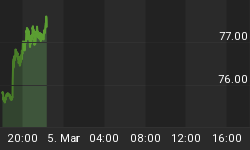With a series of coordinated pronouncements and media events, the Obama Administration has recently been trying to send a signal to investors. But the message received may not have been the one intended. Reading between the lines, the Administration is indicating the financial crisis has become so overwhelming to them that there is no alternative but to throw infinite amounts of taxpayer money at it until, they hope, it passes. But what if the very measures meant to hold the dike until the storm passes are actually undermining whatever protection we have left?
Economists generally agree that, in the long term, hyperinflation does more damage to an economy than severe recession. However, recession has always made a far more potent political impact. After all, it may be difficult to notice the monthly debasement of your paycheck (inflation), but it is abundantly clear when the check suddenly stops coming (recession). Knowing this, the Administration has chosen the path of inflation.
erican economy in severe contraction, the forces of recession far outweigh those of inflation. This gives the Administration vital breathing space to flood the economy with more money without stoking acute inflationary fears. If these fears were to become realized, interest rates would rise, pushing up the cost of the government's massive deficits and foiling the Fed's efforts to keep mortgage rates low. At the moment, the government still can raise massive amounts of cheap money (to be repaid by future generations) and take aggressive spending action against recession. However, serious questions remain about the efficacy of the program.
Much of government's spending will be deployed on wealth-consuming entitlement programs rather than on wealth-creating infrastructure projects. Therefore, the American economy will become even more imbalanced towards the consumer than it was going into the recession.
In addition to contravening economic laws, the recent string of massive government financial bailouts, economic stimuli and widely distributed guarantees all threaten the long-term credit rating of the U.S. government, the value of Treasury securities, and ultimately, the value of the U.S. dollar.
Although currently hidden by the forces of recession, latent inflation eventually will emerge. When it does, the value of the U.S. dollar will be reduced significantly. It will also put strong upward pressure on American interest rates. This, in turn, will be reflected in rising mortgage rates. Given the greatly increased size of Treasury debt, any rise in interest rates will increase the financing costs of the U.S. Treasury. In addition, the vast size of U.S. government borrowings will affect the Triple-A credit rating of the United States. If this should be cut, the costs of U.S Treasury borrowings will be increased further.
All of this should be of great concern not just to American taxpayers but also to all holders of U.S. dollars, even overseas. Already, American citizens are investing heavily in physical gold as a hedge against dollar devaluation. It was not surprising to learn that China wants to replace the U.S. dollar as the world's 'reserve' currency. On March 24, 2009, The Financial Times reported that China, as the main holder of U.S. dollars, is concerned about the inflationary impact if America continues to print more dollars. If America continues to spend beyond its means and to borrow on a profligate basis, the call for a new global 'reserve' currency will be supported increasingly by nations other than China.
It is clear that many foreign governments now share the fears of individual Americans about the long-term value of the U.S. dollar. Any erosion of its 'reserve' status would damage the dollar severely, serving to magnify the present threats. The Obama Administration is building a dike higher by taking soil from its base. When the overwhelming waters of depression break the dam, it will collapse all the faster because of this lack of foresight.
For a more in-depth analysis of our financial problems and the inherent dangers they pose for the U.S. economy and U.S. dollar, read Peter Schiff's newest book "The Little Book of Bull Moves in Bear Markets." Click here to order your copy now.
For a look back at how Peter predicted our current problems read the 2007 bestseller "Crash Proof: How to Profit from the Coming Economic Collapse." Click here to order a copy today.
More importantly, don't wait for reality to set in. Protect your wealth and preserve your purchasing power before it's too late. Discover the best way to buy gold at www.goldyoucanfold.com. Download Euro Pacific's free Special Report, "Peter Schiff's Five Favorite Investment Choices for the Next Five Years", at http://www.europac.net/reports.asp. Subscribe to our free, on-line investment newsletter, "The Global Investor" at http://www.europac.net/newsletter/newsletter.asp. And now watch the latest episode of Peter's new video blog, The Schiff Report, at http://www.europac.net/videoblog.asp.















